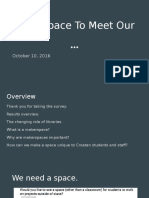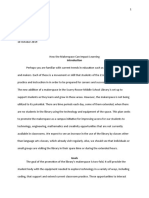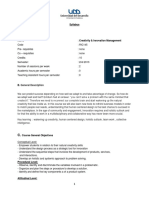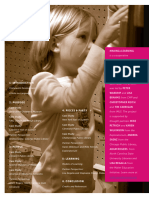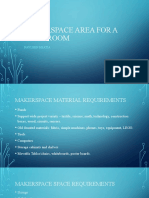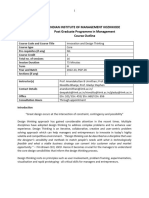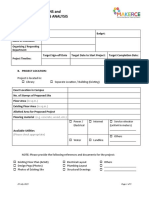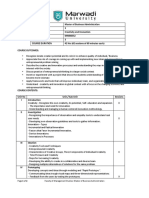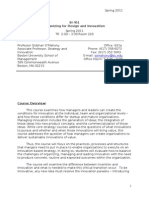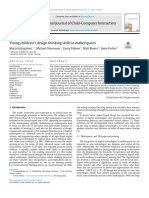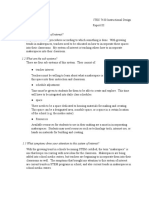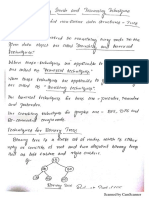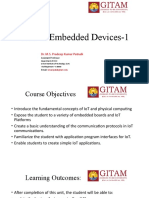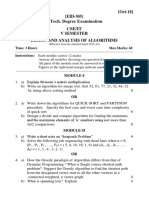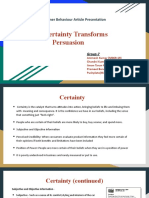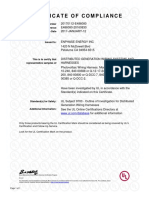Introduction
Hello, everyone, I will be discussing a new service that focuses on addressing the critical
issues of college campuses such as a lack of hands-on experience with technological tools
like CNC machines and 3D printers. Our services provide an effective makerspace that is
epically designed to empower the student with the necessary knowledge, resources, and
mentorship important for improving innovation and creativity. I will define how these
services are integrated into key operation management topics and make them more impactful
and novel to academic environments.
Explanation and justification for product and services
Our “MakerSpace” services provide access to students with different advanced technologies
and tools such as CNC machines, laser cutters, and 3D printers. Also, provided effective
mentorship and seminars for the student to improve their learning and innovation. The main
reason behind providing these services is that many students are unable to get enough
opportunities to engage with these technologies during their academic careers. Students have
limited ability to determine the entrepreneurial ideas and practical skills development
important for innovation.
Identified issues
We identified the issues of lack of institutional engagement in the workshop conducted for
discussing entrepreneurship and advanced technology. Many students face the issues of tight
schedules of academic, which leads to limited interaction of the student with their mentors
and opportunities to determine hands-on innovation, Theoretical learning only can lead to
reduced motivation and slower progress. Our services address these issues directly by
providing tools, space and guidance from experts important for creative exploration.
Following are some of the specified reasons that enhance such issues
Absence of institutional participation in either the workshops or with the particular
deadline for finishing the course as a whole, which is heavy on domains.
Participants do not have enough time to meet with mentorship for entrepreneurial and
innovative thinking.
Mentors' along with participants' motivation is reduced when they make little progress in
conceptual areas.
Makerscpace services
1
�The maker spaces provide access to students for advanced technology as well as provide an
environment that encourages students to innovate and experiment. The maker spaces are
structured to provide creativity with practical learning based on the project. Students get
effective equipment access, seminars, and mentorship that can prototype new ideas and
products and change their theoretical knowledge into tangible outcomes. These spaces
encourage students for interdisciplinary collaboration and improve entrepreneurship culture
across campus.
New about the services
The makerspace services are unique by promoting the innovation culture on campus. It
includes encouraging students to improve their knowledge and think outside the box also
taking the risk of improved cross-functional collaboration and using experimentation to
promote idea iteration and adapting the advanced technologies. We focus on flexibility and
encourage students to be engaged with technology trends and changing market conditions and
build a dynamic learning environment.
A willingness to consider unconventional ideas and viewpoints.
Encouraging creativity by fostering idea exchange via cross-functional cooperation.
Creating an environment that promotes experimentation, failure-based learning, including
idea iteration.
Adapting to shifting market circumstances and technological innovation, remaining
adaptable, and making necessary adjustments to action plans.
Operation management integration
The oversight of business procedures to achieve the maximum level of effectiveness inside an
organisation is known as operations management, or OM. In order to maximise the earnings
of a company, it deals with transforming labour and materials into services and products as
efficiently as feasible. Through out this innovative idea we need to consider some of the
operations management’s aspects of the operation’s management. Following this, the major
aspects are
Capacity and Inventory management: We could say that, provides a system for
reservations to ensure that gear can be acquired whenever required while ensuring that
supplies, like filaments for 3D printers, are always readily available. Furthermore, it's
2
�essential to divide large groups into smaller ones so that everybody gets a chance to use the
technology. An essential part of Markerspace activities engaging academic institutions is
managing inventory.
Process Design: As per our understanding, It is commonly acknowledged that given that
maker spaces utilise an experiential learning approach, their training has an impact on
students' creative and analytical thinking skills. After that, to make mentorship conferences,
use of technology, as well as seminars more accessible to students and cut down on
downtime, we will streamline the schedule.
Quality Management: Moving to quality management, we could say that, the most
successful quality management strategies now in use have been determined by several studies
(Gulden et al., 2020). After that, we go through the steps in the process of quality
management practice, which include establishing characteristics of quality, measuring, setting
standards, controlling quality, and offering continuous feedback channels through which
students can assess the level of quality of the resources, coaching programs, events, and
seminars.
Sustainability: In this another sustainability aspect, we could say that Sustainability is
crucial because it promotes ecologically friendly practices in the creation along prototyping
phases, which in turn inspires students to consider environmentally friendly components and
methods. Comprises, for instance, laws that support growth and various cultures.
Additionally, the team has access to tools for creating prototypes, that will encourage
the concept's cross-fertilization.


